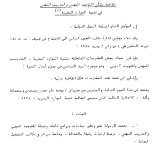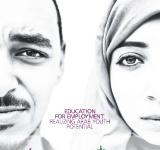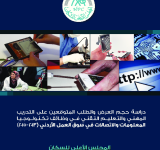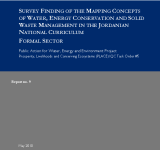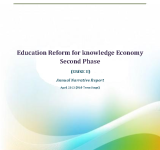vocational education
The Arab World faces extraordinary challenges. In a region with the world's highest youth unemployment rate;; millions are frustrated by their job prospects – a frustration born of education that often leaves them unprepared for the marketplace. This report shows that the private sector can be a powerful force for positive change by complementing public efforts to ensure that the region's youth gain the right skills for the jobs being created.
تهدف هذه الدراسة إلى تحديد حجم العرض والطلب المتوقع من خدمات التدريب المهني والتعليم التقني في الأردن في وظائف تكنولوجيا الاتصالات والمعلومات للمستويات خلال الأعوام (20113-2015);; إضافة إلى التعرف على دور التدريب المهني والتعليم التقني في تلبية الطلب على العمالة حسب الجنس والمحافظة والتخصص المهني والمستوى في وظائف تكنولوجيا الاتصالات والمعلومات;; وتحديد احتياجات القطاعات الاقتصادية المختلفة من وظائف تكنولوجيا الاتصالات والمعلومات ووضع التوصيات اللازمة واقتراح السياسات والبرامج اللازمة لتطوير القطاع وتمكينة من خلق فرص عمل جديدة للشباب الأردني.
The study aims to evaluate the concepts of water;; energy and solid waste that exists in the curriculum and the manner in which they are tackled by mapping the current textbooks based the three themes of the study – water;; energy and solid waste. The report is based on a comprehensive study of 104 school textbooks from grades 1 – 10 in fourteen subjects. The survey finds that the environmental education concepts were vastly covered in all subjects of he study in a total of 1777 concepts;; and most of them focused on scientific facts and information with repetitive energy concepts and lack of sequential flow. This research was conducted as part of the Public Action for Water;; Energy and Environment Project (PAP);; which aims to encourage water and energy conservation and to support behavior change towards more conservation and efficient practices both at the household level and in the commercial;; industrial and civil society arenas using social marketing behavioral methods. Based on the finding that there is little space allocated to the synthesis and application of information and knowledge and therefore the concepts remain superficially tackled;; the report recommends that support material should be prepared for the different grade levels and training programs should be developed for the teachers as real agent of change and role models.
The second phase of the Program Education Reform for the Knowledge Economy Program (ERfKE II) continues to build on the achievements of the first phase and follow the same implementation arrangements that have proven to be successful in (ERfKE I);; and in the same time;; focuses on schools as the locus of change as well as on the need to enhance capacity building at the central and field levels. The development objective of (ERfKE II) is to provide students enrolled in pre-tertiary education institutions in Jordan with increased levels of skills to participate in knowledge economy. Also the Mid-Term review highlighted the concrete progress achieved by (ERfKE II) in several key areas related to policy development;; quality of education interventions and school construction;; and identified the key issues as a summary of the overall progress that will be tackled and addressed during the remaining stage of implementation.
